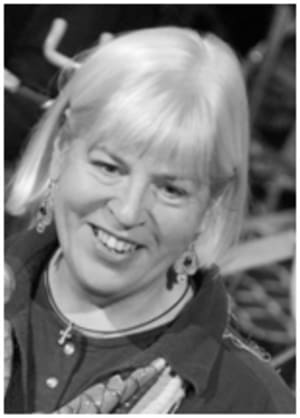One of the very few things I appreciate about malls in the Christmas season is the carols. I mean the real carols, the ones that are not only sweet on the ear but also dense with theology, enough of it that you can’t quite understand why, in our carefully tolerant multicultural Canada, anyone allows them to be played in public at all. Right alongside “Frosty the Snowman” and “I’m Dreaming of a White Christmas,” a choir belts out “Word of the Father, / Now in flesh appearing,” and “Peace on earth, and mercy mild, / God and sinners reconciled!” and “O holy Child of Bethlehem, / descend to us, we pray; / cast out our sin, and enter in; / be born in us today.”
Sometimes, careening through the mall at high enough speed to avoid the flimflam and skullduggery that want me to buybuybuy, I thank God for these caroling words winging their way into people’s ears, and pray that they may indeed reach their hearts also. Of course, we can get cynical and assume that the words of the carols won’t mean any more than “Frosty the Snowman” does. But I’ve come to know God as wily, and getting the Good News out to unsuspecting shoppers through the music and poetry of carols seems to me entirely the kind of thing God likes to do.
Recently, too, I’ve been thinking about how carols still get written—songs and poems about Christmas that enable us to hear and see the ancient Christmas story in a new light, even today. And because it’s Christmas, I’d like to introduce you to two of my Canadian favourites, plus a little taste-test for a third.
The first is by Margaret Avison. A rare bird: Avison, who died in 2007 at the age of 89, is an anomaly in literary Canada—a canonical figure, one who was even described in the 1990s as “the best poet in this country’s century,” and who was also a committed and uncompromising Christian. She won two Governor General’s Awards for Poetry, thirty years apart, and she was awarded the Order of Canada in 1985. Twenty years later she was still producing fine poetry that was stylistically pioneering, compressed, and sparse: in 2003 it was she who, in her eighties, won Canada’s prestigious Griffin Poetry Prize. One critic declared, “It is Avison’s unique accomplishment to write, in and for a secular world, about faith and God, with intelligence and without becoming either sentimental or preachy.”
Avoiding both sentimentality and preachiness is pretty key to good caroling, especially if we can’t yet hear the tune; here, for instance, are the last six lines of Avison’s poem “From Christmas through This Today”:
The light that seeks us out
is as at first
But darkness now is different, only ours
by choice.Child of our years, still help us till we know
the Lamb the only Light.(From No Time
, 1989)
I don’t know another poet, another carol, that has made me think about the way we can choose darkness even when the Light has come, and that has pushed me to ponder how we still, every Christmas, need the “Child of our years” to help us know that Light who is also a Lamb.
But what I particularly wanted to give you of Avison is the whole of another poem, a Christmas gift for both the faithful and the doubters: it’s called “Until Christmas,” and first appeared in her 1978 collection Sunblue.
When the maiden consented
the angel departed.All glory was muted
once the shepherds heeded.The all He created
hangs on this infant—helplessly human,
son, God only,light’s focus and source
now sped towards the Cross;yes, and now in glory
quickening love and longing,till the angel of His presence
becomes our Christmas incense.
This is a carol waiting for its tune to be heard. But the music will be muted, rising like incense into the ordinary air that is filled with the glory of its origins. A carol to savour slowly, two quiet, extraordinary little lines at a time.
And there’s another contemporary Christmas carol I want to introduce to you. This one is by John Terpstra, the Dutch-Canadian poet I mentioned at Easter. It’s called “The Little Towns of Bethlehem.” In fact, you may even have heard it on the radio, because for several of the years that she was Canada’s Governor General, Adrienne Clarkson read it in her Christmas message to the nation; it has also been anthologized in the United Church Book of Worship. It is a name-entranced poem about the holiness not only of Jesus’ birth but, by analogy, of every child’s birth across Canada. This is how it begins:
For unto us
in Aklavik
is born a child, in
Attiwapiskat
Gaspé
Cornerbrook, Newfoundland.
And a son is given in
Wetaskiwin
Bella Coola
Flin Flon.
And the future of the whole earth
is placed upon the shoulders of the daughter of
Tuktoyaktuk
Tignish
Swan Lake.
And the place of their birth is called
Vermilion
Temiskaming
Nain.
Picture Butte
Terpstra wants us to see the landscape of these wildly various places in the way he lays them out on the page, as much as he wants us to hear the quirky music of their names. In all these places, God sends His Spirit to give new life. Incarnation is the name of the game—not that every child “is” Jesus; rather that, insofar as God has entered human existence in the infant Jesus, God has shown us how much he loves this material world, and has confirmed the infinite value of every child.
When I first read this poem, I thought immediately of William Kurelek’s 1976 Northern Nativity story, where a twelve-year-old prairie boy in the Depression dreams “Nativity dreams” that happen all over Canada in all kinds of different contexts. Terpstra’s vision is less of a teaching parable, more of an invitation to awaken to the gift that has come:
For unto us
For into all
this night
is born a child, this night
bearing each
and the places of their birth,
and nativity is given
every name.
The first carols were songs sung as the carolers danced in a ring. Terpstra’s carol makes me want to join hands with people right across this vast continent and dance a song for Christmas. Let’s do that—even, perhaps, across the mall.
Editor’s Note: Margaret Avison’s poems appear in Margaret Avison: Selected Poems, Oxford University Press, 1991. Ms. Avison’s poems are reprinted here by permission of her estate and The Porcupine’s Quill.
John Terpstra’s poems appear in Two or Three Guitars: Selected Poems, Gaspereau Press, 2006.


